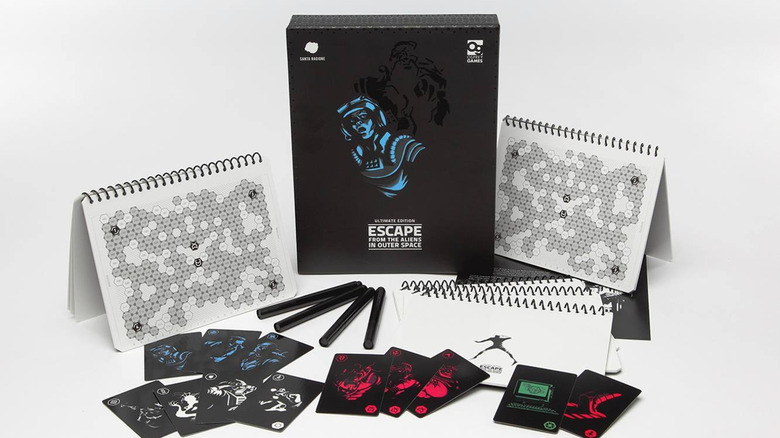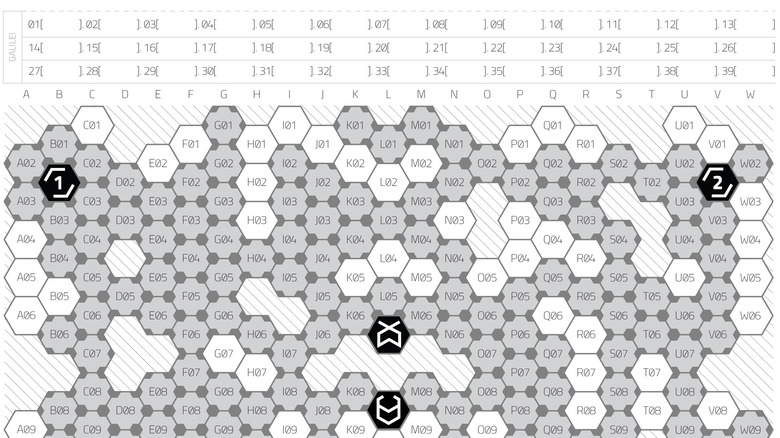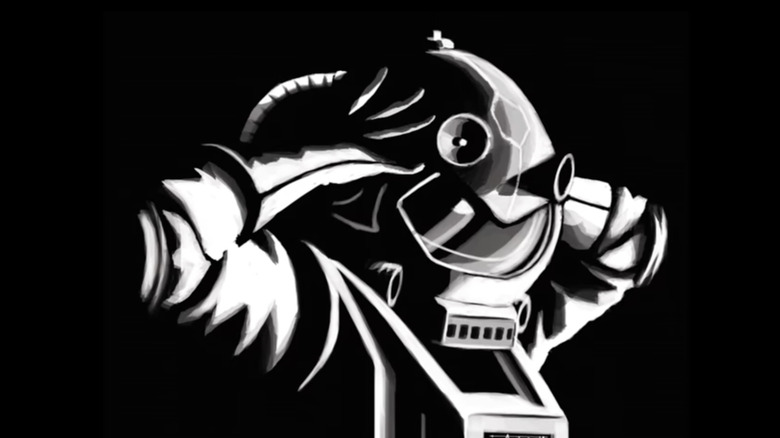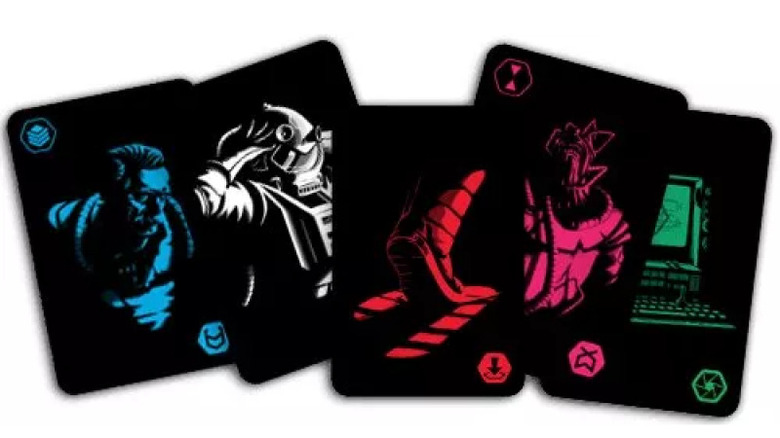Escape From The Aliens In Outer Space Is The Perfect Mix Of Horror, Social Deduction, And John Carpenter
Sometimes, it feels like board game groups only come in one of two sizes: two more or two fewer players than you want at the table. In an industry where the ideal player count is often four, finding a good game for six-plus can be quite the challenge — especially when you need to cater a game night to the least experienced person at the table.
If it sounds like I'm speaking from personal experience, well, I am. Last week, I was tasked with picking a board game for my friend's bachelor party that would work for seven players and at least two non-gamers. After several days of furious research and one Reddit post deleted by the moderators, I nearly gave up on finding the right fit.
So when I tell you that "Escape From the Aliens in Outer Space" checks every box you need for a game night with lots of players, trust me — I've done the research. One part "Secret Hitler," two parts "The Thing," this game may raise eyebrows for its lack of a shared player board and simple mechanics, but the gameplay it offers rivals that of even the most-heralded social deduction standouts.
Man versus monsters
In "Escape From the Aliens in Outer Space," your group plays a collection of scientists stranded on a dying space station. Half of you are humans, moving one hex at a time in search of the nearest escape pod. The other half? Bloodthirsty aliens who move up to two spaces a turn and whose only goal is to successfully eat all humans on the map. Get eaten as a human, and you get to respawn on the board as a monster yourself. Get eaten by a fellow alien, though, and your night is over.
Rather than operate on a centralized game board, players are handed one of eight laminated booklets and a dry-erase marker. Each game starts with the players agreeing on a shared game board, which varies in layout and difficulty depending on the size of your group and the experience level of your players. From there, your group will take turns moving around the map and tracking their paths on their private player boards.
Your movement will land you on one of two types of hexes. Secured Sectors do not require you to share any information with your opponents — you just announce that no noise has been heard this turn. Conversely, landing in a Dangerous Sector requires you to push your luck with the Dangerous Sector deck. Draw a white card, and you will tell the other players that there is no noise in your sector. Draw a red card, and you will be forced to reveal your exact location on the map. But draw a green card — the Noise In Any Sector card — and you can announce a sound anywhere on the map.
Thus, "Escape From the Aliens in Outer Space" is equal parts social deduction and pattern recognition. As you move around the map, you will constantly feed your group a combination of truths and lies about your location — and, reading between the lines, your intention towards the other players on the map. Reveal yourself as an alien too soon, and the human players will flee each sector you reveal. But reveal yourself too late, and you run the risk of eating other aliens you thought might've been humans.
A party for your party
If this sounds similar to other social dedication games, you're not wrong; I even pitched it to the group as "'Battleship' on steroids." But there are a few things that "Escape From the Aliens in Outer Space" does a lot better than its peers. Anyone who has ever been asked to plan a game night for a large group of friends knows how quickly your options narrow. Most games are not really designed to accommodate six-plus players, no matter what it says on the back of the box. At least one person is also there out of a sense of obligation; you need to pick a game that works for newcomers and veterans alike.
This is why some of the most-heralded social deduction games can be a tricky sell. You might get a richer narrative experience from a title like "Blood on the Clocktower," but there's still a chance — a good one — that you'll ask one of your least-engaged players to carry the biggest chunk of the mystery. Your friend who got dragged to a game night because they just went through a breakup? Congratulations! Their reward is having to run Pentagon-level game theory with people who take this stuff way too seriously.
And that's what I love about "Escape From the Aliens in Outer Space." From the opening turn, everyone's movements and motives are a mystery to the rest of the room — even to the other players on their team. It is entirely possible to slink your way across the map as you let the dominant personalities draw attention to themselves. There may be shared win conditions, but this game operates a lot more like an individual sport, providing a safety net for everyone at the table.
Breaking hearts in the meta-game
This brings me back to our playthrough of "Escape From the Aliens in Outer Space." Before picking the game, I met with my friend one-on-one and talked through his game night wishlist. We discussed player counts, complexity, and theme, with the hope being that we could find something a little spooky that worked for our seven-person bachelor party. And when the night was over, this was a hit for everyone on both sides of the table.
Like any social game, the meta-games that emerged from the night were the best parts. My initial strategy was to move toward the alien sector and hope that the Dangerous Sector cards would let me lie my way through the scenario. This plan was almost immediately blown up when the groom-to-be ate me in the third round of the game. But after respawning as an alien, I was able to successfully track two other players who were using Secure Sectors to move silently around the map.
"The good news," I announced to my group after resolving the second attack, "is that I've successfully located and eaten two other players. The bad news is that they were both fellow aliens." A brief pause. "Does this make me really good or really bad at the game?"
But the real heartbreak of "Escape From the Aliens in Outer Space" was when the final human managed to double-back on the map and open an escape pod halfway across the map — only to draw the one failure card from the escape pod deck. Was the game a better or worse experience for the unexpected failure at the end? You might've gotten a different answer from each person at the table.
Size matters most
If you want more complexity from the game, you can also choose to play the Ultimate Edition, which includes both character abilities and items to the mix. For example, if you play the Mutation card as a human, you can voluntarily transform yourself into an alien, perhaps snatching victory from the jaws of defeat. Your characters may be able to teleport across the map, attack an opponent regardless of role, or even quietly stay precisely where you are.
These cards can add a little surprise to an otherwise methodical experience. Whatever version of the game you end up using, though, the size of your group will determine your success. As enjoyable as it may be, "Escape From the Aliens in Outer Space" is probably not a game I would break out for anything less than six players. But for those game nights where you've got a big group to keep happy and not a lot of shared space, this is a fantastic pick.




